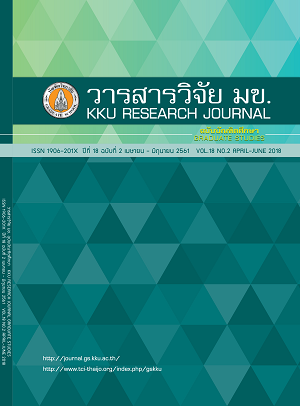แรงจูงใจและบรรยากาศองค์การที่มีผลต่อการจัดการความรู้ของบุคลากร สำนักงานป้องกันควบคุมโรคที่ 7 จังหวัดขอนแก่น (Motivation and Organizational Climate Affecting the Knowledge Management of Personnel at the 7th Office of Disease Prevention and Control, Khon Ka
Abstract
การวิจัยเชิงพรรณนาแบบภาคตัดขวาง (Cross–Sectional Descriptive Research)นี้ มีวัตถุประสงค์เพื่อศึกษาแรงจูงใจและบรรยากาศองค์การที่มีผลต่อการจัดการความรู้ของบุคลากรสำนักงานป้องกันควบคุมโรคที่ 7 จังหวัดขอนแก่น ประชากรคือ บุคลากรที่ปฏิบัติงานในสำนักงานป้องกันควบคุมโรคที่ 7 จังหวัดขอนแก่น จำนวน 128 คน เก็บรวบรวมข้อมูลโดยใช้แบบสอบถามจากกลุ่มตัวอย่างจำนวน 108 คน โดยใช้วิธีการสุ่มตัวอย่างแบบแบ่งชั้นภูมิ (Stratified Random Sampling) และการสนทนากลุ่มจำนวน 12 คน เก็บรวบรวมข้อมูลระหว่างวันที่ 20 กุมภาพันธ์ 2560 ถึงวันที่ 20 มีนาคม 2560 สถิติที่ใช้วิเคราะห์ข้อมูลได้แก่ สถิติเชิงพรรณนา สถิติอนุมานหาค่าสัมประสิทธิ์สหสัมพันธ์ของเพียร์สัน และการวิเคราะห์ถดถอยพหุคูณแบบขั้นตอน ผลการศึกษา พบว่า แรงจูงใจ บรรยากาศองค์การ และการจัดการความรู้ อยู่ในระดับมาก มีค่าเฉลี่ย 3.97 (S.D. = 0.42), 3.72 (S.D. = 0.58), 3.59 (S.D. = 0.61) ตามลำดับ โดยบรรยากาศองค์การมิติการสนับสนุน มิติการให้รางวัล และมิติความเป็นอันหนึ่งอันเดียวกัน สามารถพยากรณ์การจัดการความรู้ของบุคลากรสำนักงานป้องกันควบคุมโรคที่ 7 จังหวัดขอนแก่นได้ร้อยละ 65.4 (R2 = 0.654, p-value < 0.001)
This cross-sectional descriptive research aimed to study the motivation and organizational climate affecting the knowledge management of personnel at the 7th office of disease prevention and control, Khon Kaen province. The population was determined from the personnel who working at the 7th office of disease prevention and control, Khon Kaen province. The samples were 108 personnel randomly selected by Stratified Random Sampling from the 128 population and 12 key informants were in focus group for qualitative data gathering. Data collection was carried out from February 20th to March 20th, 2017. Data distribution was performed by descriptive statistics. Inferential statistics were Pearson’s product moment correlation coefficient and Stepwise multiple linear regression were also utilized. The results showed that motivation, organizational climate and the knowledge management were at high level with averages of 3.97 (S.D. = 0.42), 3.72 (S.D. = 0.58) and 3.59 (S.D. = 0.61), respectively. Organizational climate dimensions; support, reward and identity could predict the knowledge management of personnel at 65.4 percent (R2 = 0.654, p-value < 0.001).



